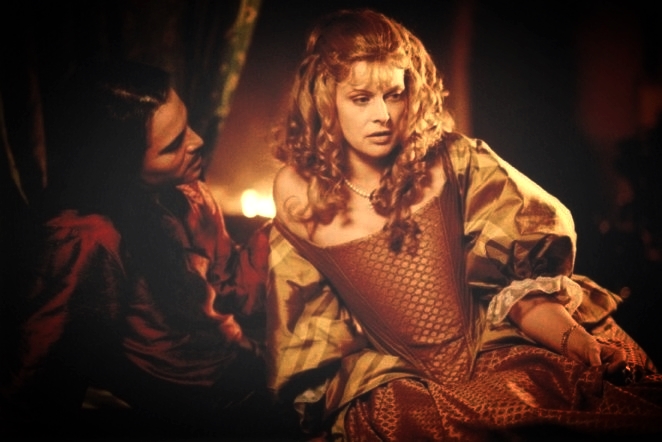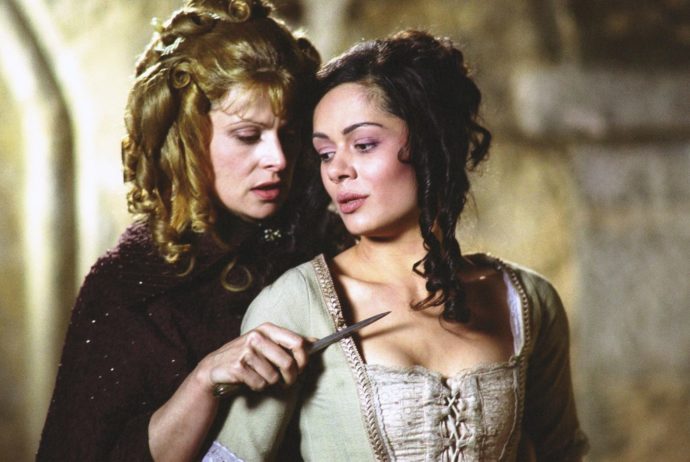Dir: Steve Boyum
Star: Susie Amy, Michael York, Gérard Depardieu, Nastassja Kinski
a.k.a. La Femme Musketeer
I once made the mistake of trying to read the original Three Musketeers novel. Let’s just say, it quickly became clear that Alexandre Dumas was getting paid by the word for his story. I didn’t finish it. The various films magde, I’ve generally enjoyed a lot more, particularly the seventies version, which also starred York, the nineties one with Kiefer Sutherland, and even the 2011 adaptation directed by the guy who did Resident Evil. This is fine as well, being a cheerful romp that was originally a Hallmark mini-series. It’s partly a reboot, partly a sequel, and partly a re-imagining, yet manages to pull the disparate elements together and ends up being an entertaining 171 minutes.
The heroine is Valentine D’Artagnan (Amy), daughter of the renowned Musketeer (York), who has retired to the country and lives a quiet life. Valentine has bigger dreams, as well as all the swordsmanship (or swordswomanship) skills her father can teach, and heads off to Paris with a letter of recommendation. Meanwhile, the shenanigans around the court continue as they did in Dad’s time. Now, it’s young king Louis XIV on the throne, with the conspiring Cardinal Mazarin (Depardieu) seeking to exercise control over the king, courtesy of a letter which casts doubt on the monarch’s parentage, and thus, legitimacy.
This is where Nastassja comes in, for she plays the Cardinal’s top spy, Lady Bolton, who succeeded in obtaining the letter from an English noble, the Duke of Buckingham. However, making her way towards Paris is Maria Theresa of Spain: if she gets there safely, and weds the king, all Mazarin’s plans go up in smoke, and it will also end the war between France and Spain. He sends his forces out to make sure Theresa never arrives. Tasked with ensuring she does, are three young Musketeers (who just happen to be the sons of famous fathers), along with Valentine, who is falsely accused of murder by Lady Bolton, after the king’s mistress discovers the letter as well as its contests, and needs to be silenced by Bolton (as shown at top).
It’s interesting to see this sitting next in her filmography to Kinski’s performance in a sixties update of Dangerous Liaisons. For I sense that Lady Bolton would have got on quite well with the Marquise de Merteuil, both being big fans of intrigue, deceit and plotting. Though Bolton is likely a better hand with a throwing knife, shall we say, and is more interested in politics than personal vendettas. She’s perhaps not quite as memorable as Faye Dunaway in the seventies Three Musketeers, who played the equivalent character of Milady de Winter. But it’s likely more in line with the cast here, which is not as stellar as its predecessor. Though in its defense, this wisely isn’t trying to be.

There is still good entertainment here. I loved the way the original trio of musketeers (including John Rhys-Davis from Lord of the Rings, as Porthos) have become a theatrical troupe, touring the country to re-enact their adventures for the locals. Also how they end up rescuing two of their sons from an unfortunate, noose-shaped situation: I’d have been quite happy if this had been the film’s main narrative, as was done in The Return of the Musketeers. But it’s only one element: as you can imagine from the above, and its almost entire separation from the plot described earlier, there are a lot of moving parts to the storyline. This is where the extended running time works in the movie’s favor: the various facets get a chance to breathe, rather than feeling crammed in.
It does have hints of a Europudding recipe here, illustrated by Kinski’s role: she’s a German actress, playing a character with an English name, hanging round the French court. Meanwhile, Amy’s accent as the heroine is less South of France, and more Sarf London, though it… drifts in and out considerably, shall we say, over the course of proceedings. The main problem is likely the blandness of the younger actors. Amy is by no means the worst offender here though: Valentine is a feisty enough character to be fun, even if the concept here requires credibility stretching at epic levels. No, the dishonors here go to the next generation of the three musketeers, who are utterly forgettable, especially when compared to veterans like York, Rhys-Davis, Depardieu and Kinski.
Filmed largely in Croatia (another slice of Europudding?), the makers get good bang for their buck, with the country providing some convincing historical locations. The pretty scenery is shot attractively by veteran cinematographer David Connell, but unfortunately, he seems much less adept at capturing the action. I mean, you’re basically doing The 3 Musketeers. There is going to be copious quantities of swordplay. Swashes will be buckled here. But in general, the fights fell victim to the curse of modern action movies, being shot too close and edited too fast. This might make sense when you’ve got Michael York, then well into his sixties and likely requiring a stunt-double for some action. But the younger versions? Get people who can handle a sword, sit the camera back a bit, and let the viewer appreciate it.
All told, however, I can’t complain much, if at all. It’s a concept which is clearly intended purely for entertainment, and this renders spurious most complaints about historical inaccuracy. Especially when they are as pedantic as one review I read, which complained that the English nobility were wearing, “The court fashions of at least ten years later.” I feel safe in assuming that most viewers of a Hallmark channel TVM, will have limited expertise in the area of 17th century clothing, and thus gaffes in this department are unlikely to impact enjoyment of the production to any significant degree. Those of us less inclined to obsess over such things should have fun with this ripping yarn. As an indication of its merits, even if a relatively small part for her, this is one of the very few Kinski-made-for-television entries which I’ve actually retained on DVD.
